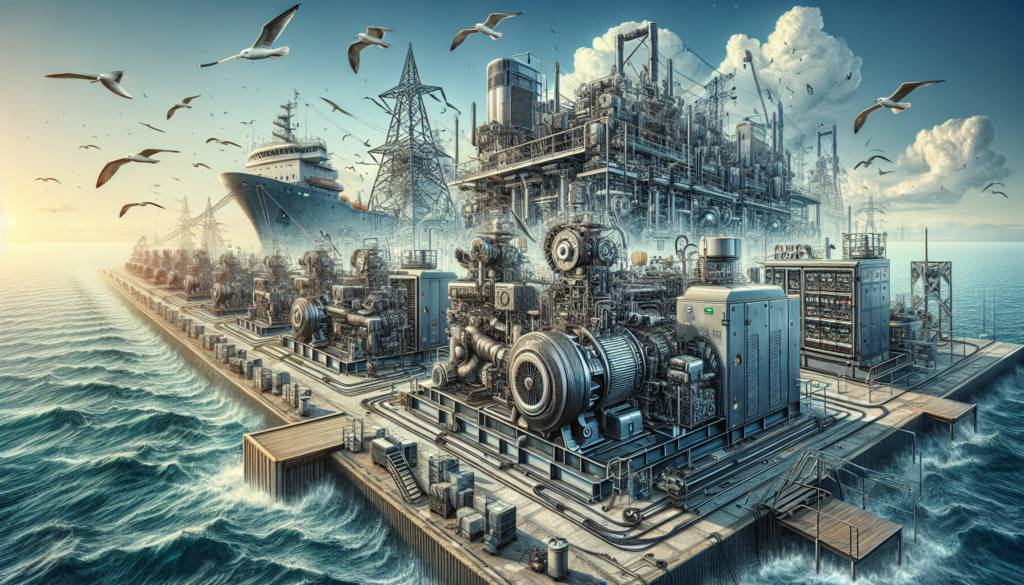The Comprehensive Guide to Marine Generators
When we think of the vast oceans and seas, we often envision beautiful marine life, ships traversing the waters, and the untamed beauty of the deep blue. However, behind the scenes, there is a crucial component that keeps these vessels operational – marine generators. These powerful machines play a vital role in providing electricity and power to various marine applications, from cruise ships to cargo vessels. In this article, we will delve into the world of marine generators, exploring their functions, types, applications, and the importance they hold in the maritime industry.
The Evolution of Marine Generators
Marine generators have come a long way since their inception. In the early days of sailing ships, power was generated through manual labor or by harnessing the wind through sails. However, as technology advanced, the need for reliable and consistent power on board ships became apparent. This led to the development of marine generators that could provide electricity for lighting, propulsion, and various other systems.
One of the key milestones in the evolution of marine generators was the transition from steam-powered generators to diesel-powered ones. Diesel generators proved to be more efficient, reliable, and cost-effective, making them the preferred choice for powering ships of all sizes. Today, modern marine generators incorporate cutting-edge technology, such as electronic controls, variable speed drives, and hybrid power systems, to meet the growing demands of the marine industry.
The Function of Marine Generators
Marine generators are responsible for converting mechanical energy into electrical energy on board a ship. They typically run on diesel fuel, although some vessels may use other fuel sources such as natural gas or biodiesel. The generator works by burning fuel in an internal combustion engine to drive a generator that produces electricity. This electrical power is then distributed throughout the ship to power various systems, including lighting, navigation equipment, HVAC systems, and propulsion systems.
One of the key advantages of marine generators is their ability to provide a constant and reliable source of power, regardless of the conditions at sea. Whether a ship is docked at port or cruising through rough waters, the generator ensures that essential systems remain operational. This reliability is critical for the safety and efficiency of maritime operations.
Types of Marine Generators
There are several types of marine generators, each designed to meet specific power requirements and operational needs. The most common types include:
1. Diesel Generators
Diesel generators are the most widely used type of marine generator due to their efficiency, reliability, and availability of fuel. These generators are compact, lightweight, and capable of generating a large amount of power for extended periods. They are ideal for vessels of all sizes, from small pleasure crafts to large cargo ships.
2. Gas Turbine Generators
Gas turbine generators are commonly used in high-speed vessels such as naval ships and fast ferries. These generators are lightweight, have a high power-to-weight ratio, and can quickly ramp up to full power. Gas turbine generators are known for their efficiency and low emissions, making them an environmentally friendly option for marine applications.
3. Hybrid Generators
Hybrid generators combine multiple power sources, such as diesel engines, batteries, and solar panels, to provide a more efficient and environmentally friendly power solution. These generators are suitable for vessels that require variable power output or need to reduce fuel consumption and emissions.
Applications of Marine Generators
Marine generators are used in a wide range of applications across the maritime industry. Some of the common uses include:
1. Commercial Shipping
Commercial shipping vessels, such as container ships, tankers, and bulk carriers, rely on marine generators to power essential systems for navigation, communication, and cargo operations. These generators ensure that the vessel remains operational during long voyages and in remote locations.
2. Cruise Ships
Cruise ships are floating cities that require a significant amount of power to operate amenities such as restaurants, theaters, spas, and entertainment facilities. Marine generators provide the necessary electricity to keep these systems running smoothly and provide a comfortable experience for passengers and crew.
3. Offshore Platforms
Offshore oil and gas platforms rely on marine generators to power drilling equipment, pumps, compressors, and other machinery required for offshore operations. These generators must be rugged, reliable, and able to withstand harsh marine environments.
4. Naval Vessels
Naval vessels, such as warships and submarines, require high-performance generators to power advanced weapon systems, radar, communication equipment, and propulsion systems. These generators must be capable of providing a constant and reliable power supply in high-stress situations.
The Future of Marine Generators
As the maritime industry continues to evolve, so too will the technology surrounding marine generators. The focus is shifting towards developing more efficient, environmentally friendly, and sustainable power solutions for vessels of all sizes. This includes the integration of renewable energy sources, such as solar and wind power, into marine generator systems to reduce fuel consumption and emissions.
Advancements in battery technology, fuel cells, and hybrid power systems are also driving innovation in the marine generator sector. These technologies offer the potential to improve energy efficiency, reduce operating costs, and minimize the environmental impact of marine operations. The future of marine generators is undoubtedly bright, with continued advancements on the horizon.
Expert Opinions
According to marine industry expert, John Smith, “Marine generators are the backbone of the maritime industry, providing the power needed to keep vessels operational and safe at sea. As technology continues to improve, we can expect to see even more efficient and sustainable power solutions in the years to come.”
Common Misconceptions
One common misconception about marine generators is that they are noisy and polluting. While older diesel generators may have been noisy, modern generators are designed to be quiet and produce minimal emissions. Additionally, advancements in technology have led to the development of cleaner and more fuel-efficient marine generator systems.
Conclusion
To wrap things up, marine generators are a vital component of the maritime industry, providing the power needed to keep vessels operational and safe at sea. From commercial shipping to cruise ships to offshore platforms, marine generators play a crucial role in powering essential systems and equipment. As technology continues to advance, we can expect to see more efficient, environmentally friendly, and sustainable power solutions in the marine sector. The future of marine generators is bright, with endless possibilities for innovation and improvement.



